Nick Clegg v Nigel Farage: Tale of the tape
- Published
Nick Clegg is preparing to go head to head with Nigel Farage in the second of two debates about whether Britain should stay in the EU. Here's a guide to the two contenders.
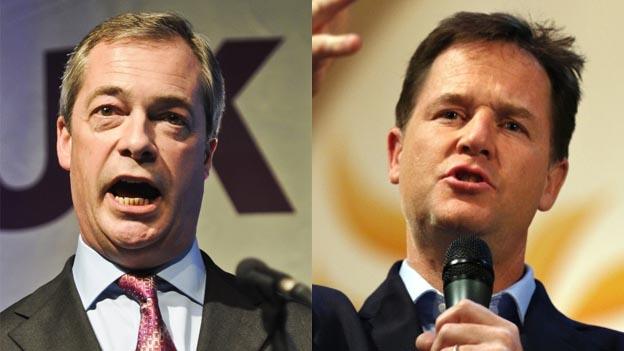
Nicholas William Peter Clegg, a 47-year-old father of three, pictured above right, has been the leader of the Liberal Democrats since 2007 and deputy prime minister in the coalition government since 2010. He has been the MP for Sheffield Hallam since 2005. Before that, he was a member of the European Parliament.
Nigel Paul Farage, a 49-year-old father of four, pictured above left, is the leader of the UK Independence Party. He has represented the South-East of England in the European Parliament since 1999 and co-chairs the Europe of Freedom and Democracy group.
What's their beef?
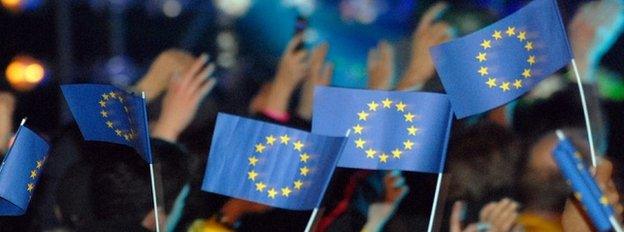
Europe. Nigel Farage has spent two decades campaigning for Britain to leave the European Union at the earliest opportunity. Nick Clegg has picked a fight with the UKIP leader because he badly wants Britain to stay in. It is the "party of in" versus the "party of out".
So they must really hate each other, then?
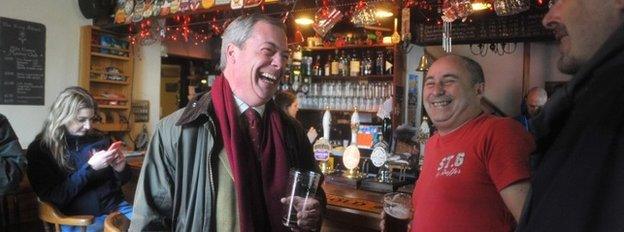
There is no real history of animosity. Farage says he always got on well with his Lib Dem counterpart when they were MEPs together in Brussels. The UKIP leader tends to reserve most of his scorn on Europe for David Cameron who, like Labour leader Ed Miliband, has declined to get in the ring on this occasion.
Best of pals?
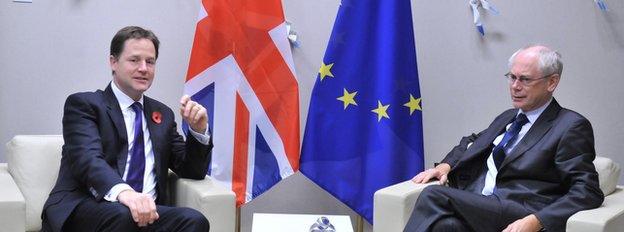
Steady on. Unless Clegg suddenly develops an enthusiasm for fly fishing, or taking part in walking tours of World War One battlefields, he is unlikely to bump into the UKIP man socially. They come from very different worlds. Farage cultivates an image as a "man of the people", who is fond of a pint of ale and a cigarette. Clegg publicly agonises over his battle to quit smoking. Clegg speaks five languages and enjoys the company of EU leaders such as Council president Herman Van Rompuy (pictured above). Farage sticks to English and enjoys being rude to EU leaders such as Herman Van Rompuy, who he famously said had the "charisma of a damp rag and the appearance of low grade bank clerk". We could go on...
So they've little in common?
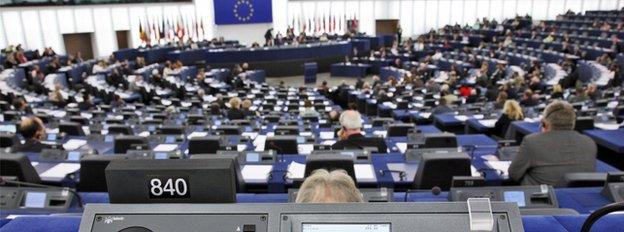
Quite a lot, actually. Apart from being former colleagues as MEPs in Brussels (and Strasbourg), they both come from well-heeled, financial families - Farage's father was a stockbroker, Clegg's ran a bank. Both were privately educated. Farage attended Dulwich College, in south London. Clegg went to the even more exclusive Westminster School, in central London. Clegg went on to Cambridge University and a job with the European Commission, while Farage went into the City as a commodities broker. As leaders of smaller parties, they are both fans of proportional representation. Both men have foreign wives - Nick Clegg married Spanish lawyer, Miriam Gonzalez Durantez in 2000. Farage married his second wife Kirsten Mehr, a German national, in 1999. And, as smokers, both men might be tempted to sneak out for a crafty fag to steady their nerves before the debate gets under way...
What's at stake?
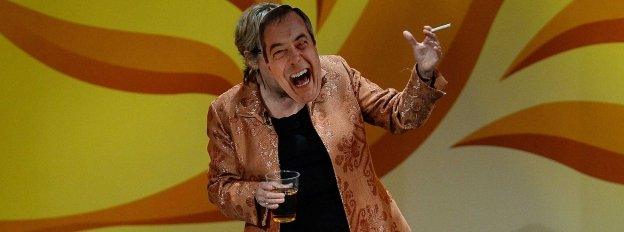
It might only be a middleweight bout, without the leaders of the two largest parties, but there is a lot to fight for. Clegg fears his party may be wiped out in May's European elections. That is why, pundits say, he had nothing to lose by throwing down the gauntlet to the UKIP man. A fight with Farage - a pantomime villain in Lib Dem eyes (see the picture of Lib Dem MP Lorely Burt above) - will play well with his core vote. Farage could hardly shirk the Lib Dem leader's challenge. But he is also in need of media exposure after boldly predicting UKIP will top May's poll. For viewers and listeners, it is a rare chance to hear a full debate about the pros and cons of Britain's membership of the European Union, ahead of a possible referendum in 2017, and enjoy what should be a great piece of political theatre.
What are their main arguments?
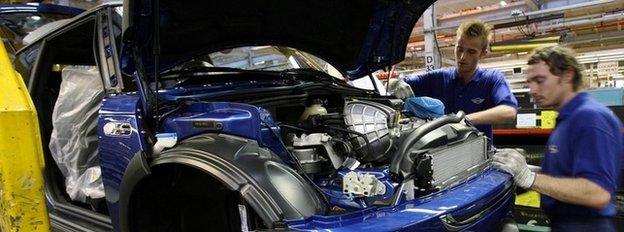
Farage will argue that Britain needs an "amicable divorce" from the EU so it can take back control of its borders and re-assert its political independence. Clegg will argue that leaving the EU would be suicidal for Britain's economy, as so much trade depends on our full membership of the single market. Immigration will no doubt feature heavily, but the Ukraine crisis and Britain's place in the world is also likely to get a look-in.
Debating strengths
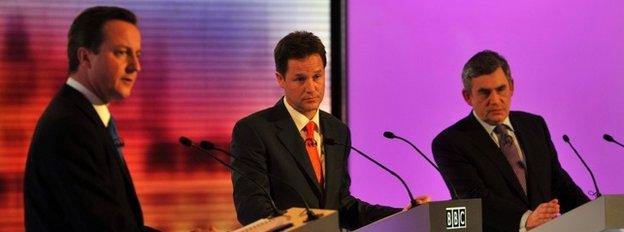
Nick Clegg is a formidable TV debater - and will be hoping to summon up the spirit of Cleggmania from the 2010 election in his clash with Farage. Expect plenty of "eye contact" with the TV camera and friendly references to the first names of audience members. The Clegg camp say their man is "match fit" thanks to his weekly LBC radio phone-ins.
Nigel Farage has a rare gift for a modern politician of sounding like a human being. Some assume his breezy, populist style masks a poor grasp of detail but he is rarely caught out on Europe. Despite the common caricature of him as a Little Englander, he has a better handle than many Westminster-based politicians on the nuances of EU politics.
Debating weaknesses
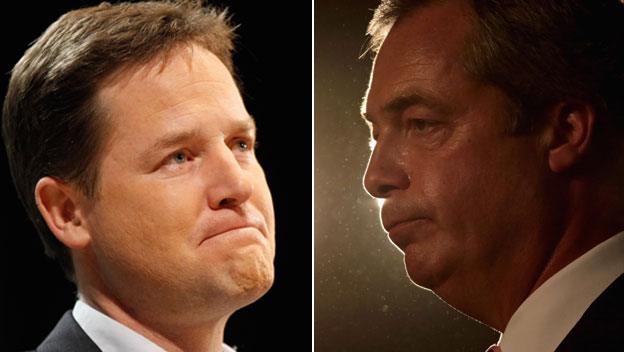
Nick Clegg used to get a bit tetchy with interviewers and political opponents when things were not going his way, but office seems to have mellowed him. His biggest debate weakness may be what he represents - the smooth, Oxbridge-educated political elite that Nigel Farage loves to rail against.
The UKIP leader can also have a short fuse (remember his anger over Godfrey Bloom's "sluts" gaffe last year?). He will want to avoid being boxed into a corner over the issue of expenses and his party's alleged exploitation of the Brussels gravy train.
What they say
Nick Clegg: "An ungenerous, backwards-looking politics has emerged in Britain. The politics of blame has found an acceptable face: it wears a big smile and looks like someone you could have a pint with down the pub. So I'm drawing a line in the sand. I am going to defend the tolerant and modern Britain we love."
Nigel Farage: "I got into politics not because I wanted a career in politics, far from it, I did it because I genuinely don't think that this European entanglement is right for our country, and I think a lot of people have woken up to the idea that we have lost control of our borders. It's costing us money. Now is the time now, this is the moment for UKIP to achieve what it has set out to do - and we are going to do it."
What others say
"It's not like the political class had an extraordinary annual general meeting and appointed Clegg as its new anti-Farage attack dog: with his customary chutzpah, he simply appointed himself to the role. But could you imagine a more perfect embodiment of everything UKIP voters take against?," writes John Harris in The Guardian., external
"Hopefully, Clegg will use the debates to flesh out his ideas for EU reform in greater detail instead of repeating discredited claims about 3 million jobs being lost in the event of an exit," says Pawel Swidlicki on the Lib Dem voice blog, external.
"As leaders of smaller parties, both Mr Clegg and Mr Farage sometimes struggle to achieve the media coverage given to the Conservative and Labour leaders. So guaranteed airtime without such rivals getting in the way means the debates are potentially 'a win for both of us', in the words of one person involved," says James Kirkup in The Telegraph., external
* There will be full live coverage in video and text of the two one hour debates, at 19:00 GMT tonight and the same time on Wednesday 2 April, on the BBC News website and both debates are being shown live on the BBC News Channel. The BBC debate will be live on BBC2 and is being presented by David Dimbleby.